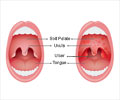Britain eased restrictions on animal movements imposed over a foot and mouth outbreak Wednesday, even as the European Union extended its ban on British meat and livestock exports.
"The decision has been taken to permit the movement of live animals direct to slaughter and the collection of dead animals from farms" from midnight Wednesday (2300 GMT Tuesday), said Britain's chief vet Debby Reynolds.The move was welcomed by British livestock farmers keen to get their industry running again, but just hours later the news came from a meeting of European Union veterinary expert in Brussels that there would be no such relaxation on exports.
"Britain should continue to be treated as a high-risk zone in view of the uncertainty of the situation," said Philip Tod, spokesman for EU Health Commissioner Markos Kyprianou.
"The situation has not stabilised," he added.
The EU formally imposed the export ban on Monday and Wednesday's decision means it will remain in place for at least another two weeks.
A European Commission statement said EU member states were unanimous in their decision and it "welcomed the effort being made to rapidly identify the source, and encouraged the UK to continue its investigations on this matter".
Advertisement
Another meeting of the veterinary expert group will be held on August 23.
Advertisement
"I continue to urge all farmers to take the highest level of biosecurity measures," she said.
The highly contagious foot and mouth disease has been confirmed in cattle at two farms since last Friday and some 200 cows have already been slaughtered.
Reynolds said she had ordered a cull of livestock on a third site nearby on suspicion of "dangerous contact" with the virus.
British farmers fear a repeat of the costly 2001 foot and mouth outbreak, which cost the national economy around eight billion pounds (11.8 billion euros, 16.3 billion dollars) and devastated the agriculture sector.
The probe into the source of the latest outbreak has focused on whether a laboratory employee at the Pirbright site -- shared by the government-funded Institute for Animal Health and a private vaccine-producing company, Merial Animal Health -- was to blame for a localized virus leak.
A preliminary report Tuesday said there was a "strong probability" that Pirbright was the source of the outbreak and added there was a "real possibility" that human movement spread the disease.
The Health and Safety Executive (HSE) report did not rule out sabotage, saying there were various potential routes for "accidental or deliberate transfer of material" from the site.
Merial reiterated Wednesday that it had found no breaches in its own security.
In a separate statement, the company also said that inspectors had cleared one of its employees, after media reports suggesting a link between a Merial staff member who had an allotment (vegetable plot) near the infected farms.
Merial, which is owned by US drugmaker Merck and Co. Inc and France's Sanofi-Aventis SA, has been asked temporarily to restart production of foot and mouth vaccines and manufacture 300,000 doses in case the outbreak spreads.
The government investigators "have advised that they have no evidence linking this member of staff to the outbreak," it said.
British National Farmers' Union president Peter Kendall welcomed Wednesday's decision to ease animal movement restrictions.
"This is a measured and very necessary first step on the road towards getting the industry back to normal and maintaining supplies of home-produced meat to consumers," he said.
"But it should not be taken in any way as a signal that we can afford to drop our guard. It is as vital as ever that livestock farmers remain vigilant, check their stock regularly and report anything suspicious immediately."
Source-AFP
LIN/J








